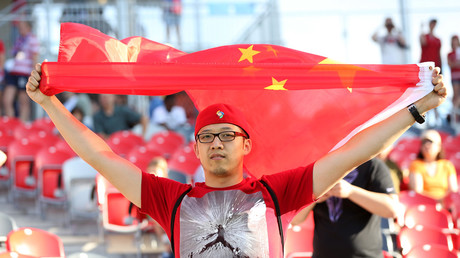US has to come to terms with its place in the world, just as Britain did when its empire collapsed

The president and his generation of Americans grew up in a world where the USA was the greatest superpower in human history. It was not just their vast arsenal of nuclear weapons and their war machine but, in 1945, around 50 percent of the entire world’s economy was in the United States of America, with Britain and the USSR hobbling along with around 10 percent each. America dwarfed the power that the British empire had in the 19th century.
In the years that followed, America would intervene all over the world, not to spread democracy, but to overthrow governments that were not working in America’s commercial interests. Whether it was the coup that removed the government of Iran in 1953 and brought back the dictatorship of the Shah; or the military coup in Brazil in 1964 that overthrew a socialist, democratically elected government; or the dozens of other coups around the world, America crushed any opposition to its economic interests.
Some 45 years after the end of the Second World War came the collapse of the Soviet Union, by which time America’s share of the global economy was down to 25 percent. The collapse of the Soviet Union unleashed a wave of assumptions about the future. The most significant of these was Francis Fukuyama’s 1992 book ‘The End of History and The Last Man.’ This was met with acclaim around the world as he argued that the ideological evolution of humanity was over with the triumph of Western liberal democracy. Fukuyama had previously worked in the US State Department under Ronald Reagan and later worked for the first George Bush. Now he is a senior fellow at Stanford University and has just published a book called ‘Identity’ looking at the current political situation. But it was his 1992 book that dominated the political debate as he predicted that the collapse of communism meant there was only one system left for our planet: pragmatic liberal democracy, and the world would never change again.
In an interview in The Guardian, Fukuyama talks about the “ruthless cunning of Vladimir Putin” and points out that Trump and Brexit are a backlash against multiculturalism and international cooperation. He warns that “globalization has clearly left a lot of people behind. There is greater automation, greater inequality.” He says he believed the financial crash would see a surge of left-wing populism and was therefore surprised by the rise of Trump.
Across much of the capitalist West, tens of millions have seen their lives get worse and this has fueled the growth of far-right groups and racial hatred. But different things are happening elsewhere in the world, of which the most significant is the rise of China. Around 40 years ago, China was a basket economy with 90 percent of its people living in poverty, but the economic strategy of China has lifted over 500 million Chinese out of poverty and their economy has grown to a point where it is about to overtake the USA. Not surprisingly, this has caused a backlash in the American establishment.
Paul Wolfowitz, a key player in America’s invasion of Iraq, had warned back in 1992 in a secret memo to Defense Secretary Dick Cheney that “our strategy must now refocus on precluding the emergence of any potential future global competitor.” But with the growth of China’s economy and America’s economic decline, Wolfowitz’s strategy has now become the consensus in the American government, including Democrats like Barack Obama and Hillary Clinton. During Obama’s administration, they were pushing aggressive policies by expanding NATO to encircle Russia and devising a strategy for the economic containment of China. Obama’s Trans Pacific Partnership (TPP) tried to create an economic bloc around the Pacific that would exclude China. Fortunately, this was rejected by most Asian governments and never happened.
America’s paranoia about China ignores why Beijing’s economy has soared. Unlike the West, which allows the financial sector to dominate and set the economic agenda, China focused on scientific and technological development, investment in infrastructure (like high-speed rail) and kept its financial center under firm regulation, thus avoiding its banks collapsing as they did in the West in 2008.
Sergei Glazyev, a key adviser to President Putin, has warned against the continuing US and EU sanctions against Russia, and the capricious policy of the Trump administration that has seen the start of a trade war. He warns that “if the US keeps contradicting international law… the first measure we would have to take together with China and other countries who are suffering from US aggression would be to get rid of the dollar as the key international currency.” China, he said, “has created the most progressive system in the world for directing economic development, combining planning with market self-regulation, and subordinating private initiative to the needs of raising the general welfare through an increased volume and efficiency of production.”
Another consequence of China’s growth is BRICS (Brazil, Russia, India, China, South Africa). These countries are increasingly cooperating and as their economies continue to rise, we will never again see a world in which one country’s economy can dominate the whole planet, as was the case with America after 1945.
This global economic shift has caused a backlash with former British prime minister Tony Blair claiming: “America needs Europe united and standing with it, not isolated as individual nations, able to be picked off one by one by the emergent new powers.”
China’s President Xi, speaking at the G20 conference two years ago, warned that “we can no longer rely on fiscal and monetary policy alone,” and called for spreading visionary and inclusive economic growth driven by innovation in science and technology… “to spearhead the fourth industrial revolution.” He went on to promise direct support to help the countries of Africa see their economies grow.
Xi also said“the Silk Road Economic Belt is progressing rapidly and the Maritime Silk Road is well underway. But this is not China creating a sphere of influence but rather a means of supporting the development of all countries. We are not building China’s backyard garden but we’re building a garden to be shared by all countries.”
Also, in September 2016, Russia’s President Putin advocated“big, ambitious, complex and long-term tasks” to transform Russia’s Far East into a hub of Eurasian development. At the same time, President Obama was still pushing for the TPP and demanding that “America should write the rules, not China.” A significant response to Obama came from Germany’s Minister of Economic Affairs Sigmar Gabriel, who said: “In my opinion, the negotiations with the United States have de facto failed because we Europeans did not want to subject ourselves to America’s demands.”
These views were not shared by Britain’s Prime Minister May, as she launched what seemed to be the beginning of a new Cold War against Russia. Her views were echoed by the Sunday Telegraph’s editor, Allister Heath, who called for Britain to take the lead in creating a new global military and economic alliance to enforce democracy but also capitalism across the globe. Heath’s column was titled ‘Forget NATO. We need a new world alliance to take on totalitarian capitalists in Russia and China.’ Heath continued: “NATO is no longer enough: it is too European, too many of its members are outright pacifists and Turkey’s membership is problematic.” Heath claimed that the new alliance he was advocating “would be the biggest shift in geopolitics since the creation of the UN. It would dramatically shift the global balance of power, and allow the liberal democracies finally to fight back. It would endow the world with the sorts of robust institutions that are required to contain Russia and China…”
No one power is ever going to dominate the world again. The choice we face is to cooperate with the emerging new economies like China and those that will follow around the rest of the Third World or get caught up in an economic Cold War led by the American establishment and its UK ally. America has got to come to terms with the world as it is now, just as Britain had to the same when its empire collapsed. We should work with China and Russia and the other emerging economies and, in doing so, ordinary people around the world will benefit – including in the USA, if only America stops looking back to the past.









Nessun commento:
Posta un commento